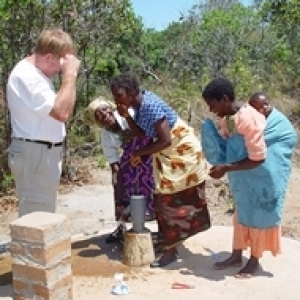Planning meeting for a new Forestry Project
This is my 40th visit to Malawi with Mary trailing a little at 38.
Now the trip is a little easier as we fly from Dublin to Addis and then overland to Lilongwe. When 3 planes arrive together and most arriving passengers have to buy visas from a single man who writes out each one individually, and then all our bags ended up all over the place, it was time to call it a day and skip the immediate 400 km drive North so this time we opted to stay in Lilongwe overnight.
We drove up on Saturday, planned on Sunday, and met staff early today.
After a quick greeting and hugs for all we went full steam ahead to a meeting on Trees and Forestry which will be our new focus this year.
Almost 13 years ago when we took this trip we were startled that, for maybe half our journey we had mature forest on both sides of the road; mile after mile of mature pines. However, over the period the hundreds of thousands of acres of State Forest had been decimated by felling and selling with little of no gain to the local rural poor population.
The only bright spot this trip is where a private Indian company, Raiply, are replanting serious acreage of pine trees for their timber business which grow to maturity at an enormous rate.
Any trees the loggers don't get the tobacco growers gobble up.
To make things worse, Malawians just don't sow trees.
At Wells for Zoë the focus for the past 12 years has been on pumps and clean water, delivering clean safe water to about 150,000 villagers a year now. We will also produce about 40,000 fruit trees this year and we currently support 189 girls in Secondary School. We also support an ever increasing number of preschools and our farming is organic and sustainable. We have no Government or Corporate funding and we are now looking to support tree planting.
So why trees?
We came to Malawi because we were upset by the sight of four little girls carrying buckets of water for miles, on their heads. For a long time now we consider this to be slavery.
Alfred, head of our pumps department and the one who does the pump installations, noted that now we have solved the water issue so many, women and girls are still walking miles for firewood; a problem which needs solving.
And strange as it may seem, collecting firewood is also, like water, the responsibility of women and girls.
Since the beginning of the year he has been quietly talking to women's groups about the possibility of sowing trees around their houses.
Like with pumps the solution is neither rocket science or difficult.
All they needed was seeds and training and they are on it.
Planting woodlots is the buzzword and we'll settle for it. The trees sown are coppicing varieties and when cut for firewood after three years just sprout and grow more vigorously.
At each pump we are giving a household 20 seeds and 20 potting tubes and the bit of training. Given that there maybe 25 households per pump (often more) that's 500 trees and 1500 over the three year cycle in each pump location. As an incentive we will provide each household with fruit trees when these woodlots trees are planted, growing and cared for. This will continue over the three year cycle.
In the first half of this year we have installed 280 pumps and have a target of 500 for the year. Doing the simple maths that is 250,000 or 750,000 over the 3 year cycle.
I love these numbers and if we have plant failures for any reason we can retrain, replant and reincentivise to start again.
It won't be plain sailing but the cost is minimal and the big incentive of apple trees, which are rare and sought after by all, might be the carrot and we have about 8000 at our farm ready for action.
The second part of our most exciting meeting was about forestry planting. Forestry is a bigger issue, a business issue.
For a few months now all our people have been promoting this with Community leaders, Women's groups and Church groups.
We are not rattling on about Global warming, Climate change, The Environment or Saving the Planet but are focusing on the money. All the rest will be achieved as a by-product. Our focus for the month here is on driving home this message.
With communities we are planning for football-field-sized development giving us 10,000 trees for poles or 2,500 pine trees. Again we are providing the seeds and the potting tubes and training and they get on with the rest.
Here we will be dealing with men and land and, I suspect, more problems or issues, but as with pumps and preschools we will work with those who want to help themselves.
I love the sound of a million trees and a million people with clean water.
I love the idea that it can now be achieved by totally voluntary effort of ourselves and our friends everywhere.
And I really love that it will benefit the poor, uneducated, but amazing women of Malawi to whom all this effort of ours is dedicated.
Maybe a 'Watch this Space' might be appropriate.
The picture shows the group of our employees (all-Malawian) at the meeting.

Comments
Sign in or get an account to comment.


